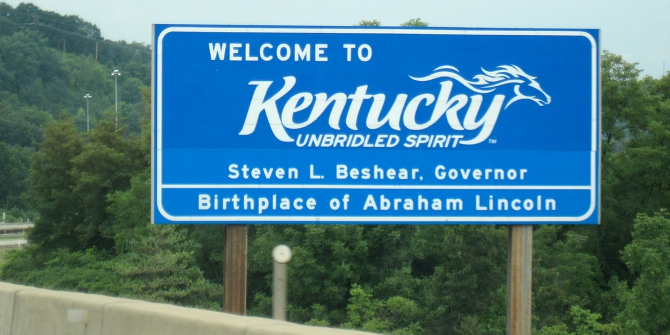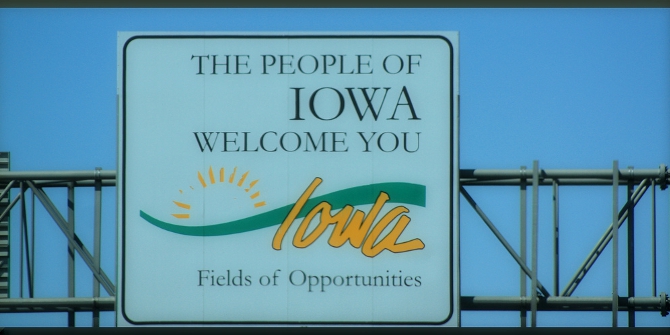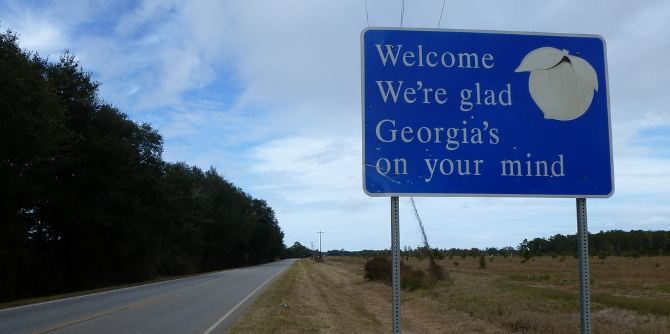 Amidst allegations of assault against a Guardian reporter just days before the election, it was speculated that Republican candidate for Montana’s sole House of Representative seat, Greg Gianforte, would suffer at the ballot box. However, though the nature of Montana’s early voting system led some to argue Gianforte would only experience a smaller backlash from voters (given that many votes had already been cast), Mara Suttmann-Lea argues that the nature of partisanship and voting behavior in Montana means that even without early voting, Gianforte may well have won regardless of his assault charges.
Amidst allegations of assault against a Guardian reporter just days before the election, it was speculated that Republican candidate for Montana’s sole House of Representative seat, Greg Gianforte, would suffer at the ballot box. However, though the nature of Montana’s early voting system led some to argue Gianforte would only experience a smaller backlash from voters (given that many votes had already been cast), Mara Suttmann-Lea argues that the nature of partisanship and voting behavior in Montana means that even without early voting, Gianforte may well have won regardless of his assault charges.
The May 25th, 2017 special election for Montana’s sole U.S. House of Representatives seat took an unexpected turn on the eve of the election when Republican candidate Greg Gianforte was charged with assault for body slamming a reporter. The race between Gianforte and Democrat Rob Quist had been tightening in recent weeks, and Democrats surmised the turn of events might tip the scales in their favor on Election Day.
A problem for the Democrats, however, was that an estimated 7 in 10 Montanans had already voted; Montana allows any resident to vote before Election Day by absentee ballot either by mail or in person. Gianforte’s assault occurred late enough so that almost no Montanans voting early would have a chance to reassess their vote choices, except for those who waited to mark absentee ballots after the assault and deliver them to an Elections office on Election Day. Once the final results were tallied, political observers were quick to suggest early voting helped ensure a win for Gianforte despite the shocking nature of the assault. Too many Montanans, they argued—unable to change their vote choice—had cast ballots by the time of the assault for the event to change the outcome.
Political scandals like Gianforte’s attack have the potential to shift final vote margins up to about 10 percentage points. But, as highlighted in analysis done by FiveThirtyEight, in the Montana special election this shift affected just the third of the voting electorate that had yet to vote by Election Day. This meant that Quist’s overall margin could only theoretically improve by around three percentage points. On the surface, then, it is plausible to argue that early voting may have prevented the scandal from making a larger impact. Gianforte performed better in the early vote than Quist, leaving him with too large of a deficit to make up on Election Day. Had most voters cast their ballots on Election Day, Quist may have enjoyed a larger portion of the 10 percent scandal shift, as more of Giantforte’s voters would have headed to the polling both with information about the assault, potentially enough to swing the outcome in his favor.
However, there are important trends to consider that complicate our understanding of the impact of early voting on the outcome of the Montana special election. First, early voters tend to be more strongly partisan, making it unlikely that, if those same partisans voted on Election Day instead of early, enough would have been swayed to change the outcome unless the race was extremely close. There is little reason to believe that enough early voters would have changed their minds had they voted on Election Day to change the outcome. My research suggests that, alongside being more likely to make a candidate choice and stick with it early on in a campaign season, strong partisans make up such a large portion of the early voting electorate because campaigns primarily use early voting as an additional opportunity for voter mobilization to ensure the party faithful actually cast ballots, not sway undecided voters.
Second, while one can make a normative argument that even strong partisans should have a moral compass and not vote for someone with assault charges, from an empirical perspective, research tells us that, realistically, it takes a lot to change the minds of strong partisans. It’s unlikely that enough hardline Republicans would have changed their vote following the Election eve assault. In fact, some analysis of election outcomes showed that while Quist did get a boost in some Montana counties on Election Day after news of Gianforte’s assault, it was more or less cancelled out by results in other counties where support for Gianforte increased after the incident. In fact, Election Day voting in counties more reliably Republican or Democrat actually moved closer towards their respective partisan tendencies on Election Day.
Given that conservative counties make up the majority of Montana counties and that a number of these have high populations of voters, an uptick for support for Giantforte in these counties likely washed out any increase in support for Quist. A breakdown of county-by-county election results tentatively affirms this assumption; there were more highly populated conservative leaning counties available to push back against news of the assault by asserting their support for Gianforte than liberal leaning counties to boost support for Quist. This is a classic example of motivated reasoning, which suggests strong partisans, when confronted with information that runs counter to their prior beliefs or preferences, nevertheless persist in these preferences, sometimes more strongly than before.
Finally, there is one group of early voters that may have theoretically made a difference had they waited to cast ballots until Election Day. Independent and younger voters, though less likely to vote early, if they do, will wait until later on in early voting periods to cast a ballot. Thus, it is plausible to argue that these voters, though they cast ballots closer to Election Day, would nevertheless miss revelations that break as late as Gianforte’s assault. In Montana, had these groups of voters all waited until Election Day to vote, news of the assault may have influenced their vote choice more heavily than partisans casting ballots earlier during early voting periods.
But this would only have mattered for the election outcome if enough of those independent and younger voters had cast their “late-in-the-game” early ballots for Gianforte to be swayed by news of the assault were they to instead vote on Election Day. In reality these voters were more likely to vote for Quist than Gianforte in the first place. While both candidates paid attention to early voters, Quist’s campaign placed greater emphasis on turning out independent and young voters than Gianforte, whose efforts were more focused on mobilizing older, consistent voters. Even if there were a number of late-in-the-game early voters who were on the fence about voting for Giantforte but ultimately cast their absentee ballot for him, likely there were not enough of these voters to make a difference had they instead waited to cast ballots on Election Day and decided to vote for Quist following the assault.
In sum, though it is admittedly difficult to determine with empirical certainty whether or not early voting cost Quist the election, there is little reason to believe that there would have been enough early voters available to change their vote preference and hand Quist a win had they waited to cast their ballots until Election Day. Because the makeup of the early voting electorate is generally more partisan and less likely to change their vote choice with updated information, it’s not likely enough Gianforte voters would have been willing to switch support to Quist following the assault. And even though early voters casting ballots later in a voting period may be weaker partisans and more susceptible to changing their minds following late breaking revelations, these groups—independents and young voters—were more heavily courted by Quist’s campaign than Giantforte’s. The number of weak partisans voting later in the early voting period for Gianforte was likely too small to affect the outcome had they wanted to change their choice and vote for Quist after news of the assault broke.
“Vote” by Joe Shlabotnik is licensed under CC BY-NC-SA 2.0
Please read our comments policy before commenting.
Note: This article gives the views of the author, and not the position of USAPP – American Politics and Policy, nor of the London School of Economics.
Shortened URL for this post: http://bit.ly/2r4yeUJ
________________________________
 Mara Suttmann-Lea – Skidmore College
Mara Suttmann-Lea – Skidmore College
Mara Suttmann-Lea is a visiting assistant professor of political science at Skidmore College. Her research is situated at the intersection of state and local electoral institutions, campaigns, political participation, and American political development. She studies how the responses of political actors to changes in election laws have unintended consequences for American political behavior and institutions.







It is great the way you explain the shift in final vote margins up..Great post.Thank you